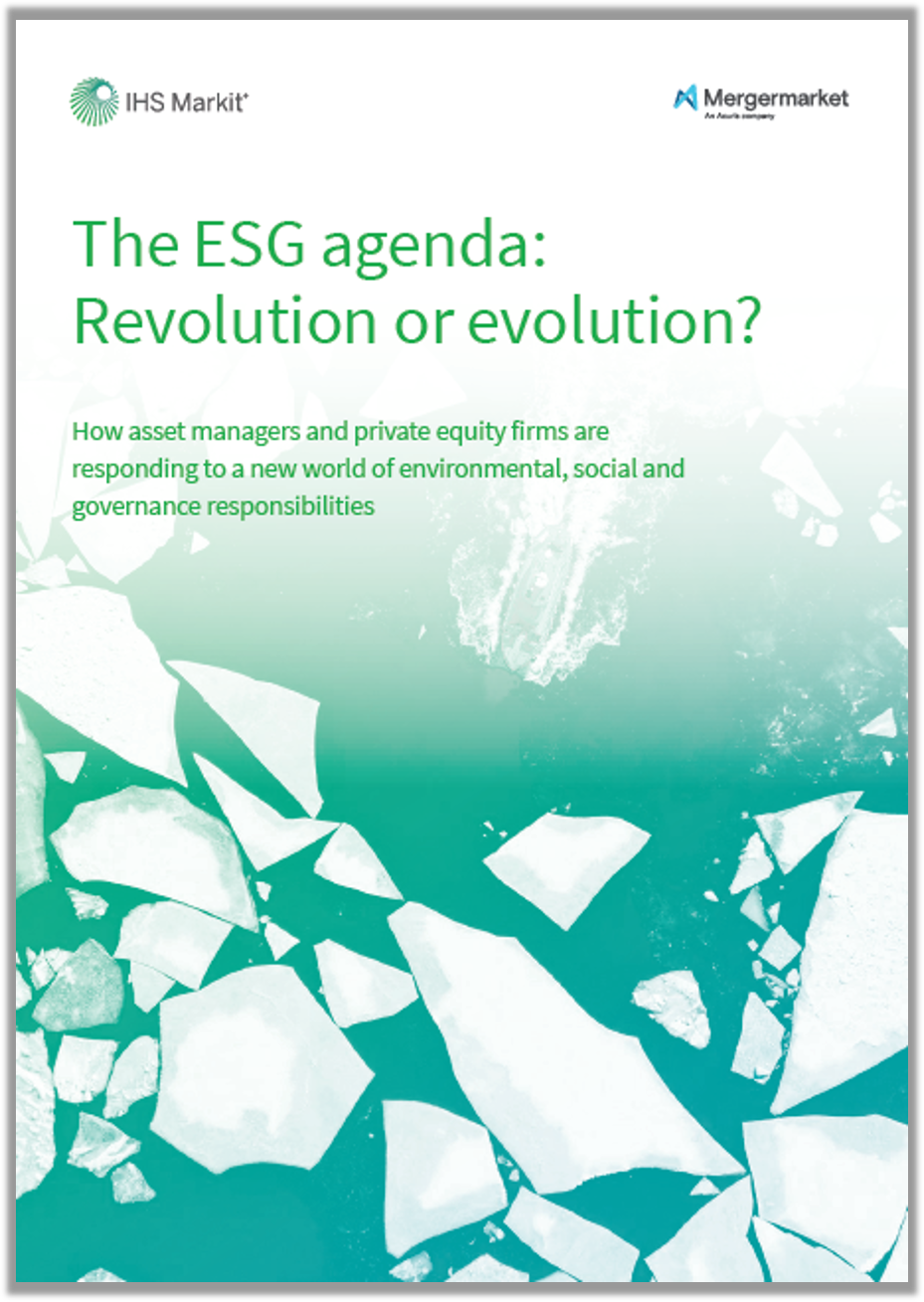Featured Topics
Featured Products
Events
S&P Global Offerings
Featured Topics
Featured Products
Events
S&P Global Offerings
Featured Topics
Featured Products
Events
S&P Global Offerings
Featured Topics
Featured Products
Events
Financial and Market intelligence
Fundamental & Alternative Datasets
Government & Defense
Professional Services
Banking & Capital Markets
Economy & Finance
Energy Transition & Sustainability
Technology & Innovation
Podcasts & Newsletters
Financial and Market intelligence
Fundamental & Alternative Datasets
Government & Defense
Professional Services
Banking & Capital Markets
Economy & Finance
Energy Transition & Sustainability
Technology & Innovation
Podcasts & Newsletters
ARTICLES & REPORTS — Oct 26, 2021

By Alex Merola
ESG factors are playing an increasingly important role in the investment process for asset managers and private equity firms. However, ESG also creates challenges for investment managers as they work to build their expertise amid inconsistent data standards.
The vast majority of private equity and asset management executives, 80%, believe that ESG will play a vital role in their investment decisions over the next year or two, according to a recent survey from IHS Markit and Mergermarket. With that, though, comes several hurdles to overcome in order to enact a successful ESG agenda and gauge its performance.
The survey, which informs our new whitepaper, shows that respondents are juggling a variety of key challenges — both external and internal — as they work to incorporate their ESG agenda into investment decisions.
Though firms know ESG is important, the survey exposed a struggle to build expertise and consensus. Of those surveyed, 60% have concerns about a shortage of ESG knowledge within their own firms, and 23% said that differing opinions among internal stakeholders complicated potential transactions.
Participants included executives from firms based in North America or EMEA with at least US $1 billion of AUM.
The initial investment is only the start of the ESG challenge. Nearly all asset managers and private equity firms in the survey confirmed that they continued to work on ESG issues throughout their investments' lifecycles. Nearly half (48%) said that this ongoing work is focused on benchmarking, using their broader portfolios to generate helpful metrics to measure progress; additionally, 41% said they are leveraging external experts to work with their portfolio businesses on ESG performance. However, many fund managers still struggle to get full clarity as they engage with portfolio companies on ESG reporting.
Investment teams struggle to evaluate the ESG merits of deals when common benchmarks are still not widely adopted and data on target companies is scarce or non-existent. "Standards have to be precise for us to make effective comparisons when exploring ESG-related deals," one respondent noted. "But there is real confusion."
Many survey respondents currently use at least two or three different ESG reporting frameworks; the rest use three or four. They included:
More than half (53%) of respondents use each of the last three frameworks in the list above.
The use of disparate frameworks means that firms must report the same information in different ways, creating burdensome duplication. More than three-quarters (83%) of those surveyed said they expect to increase the amount of ESG-specific reporting they do over the next 12 to 24 months. The development of additional frameworks continues to complicate the situation.
While there has been some effort to streamline these standards in recent months, asset managers and PE firms are eager to see greater simplification. An 80% majority of respondents said that a standardized framework would be beneficial for ESG reporting.
Collecting and managing key ESG data on portfolio companies and finding effective ways to leverage that data for positive impact remains a top hurdle for private market investors.
More than a third (37%) of those surveyed said they were concerned about their ability to manage, store, and analyze data effectively, while more than a quarter (27%) highlighted difficulties in consistently collecting reliable data.
Many firms are already preparing, with a heavy emphasis on adopting technology to help them meet their needs. Of those surveyed, 57% said that they expect to invest more in general technology rather than specific ESG tools, while 50% of firms also expect to increase their investment in data analytics.
Even if all the frameworks coalesce into a universally accepted standard, the rapid growth of ESG investment means many asset managers and PE firms will need to ramp up their capabilities. Global ESG assets under management are on track to exceed US $53 trillion by 2025, according to research from Bloomberg Intelligence, representing more than a third of all AUM worldwide.
Download the full whitepaper, " The ESG agenda: Revolution or evolution?" to read more about the survey results.

Posted 26 October 2021 by Alex Merola, Executive Director of Commercial Strategies, ESG & Private Markets, S&P Global Market Intelligence
S&P Global provides industry-leading data, software and technology platforms and managed services to tackle some of the most difficult challenges in financial markets. We help our customers better understand complicated markets, reduce risk, operate more efficiently and comply with financial regulation.
This article was published by S&P Global Market Intelligence and not by S&P Global Ratings, which is a separately managed division of S&P Global.
